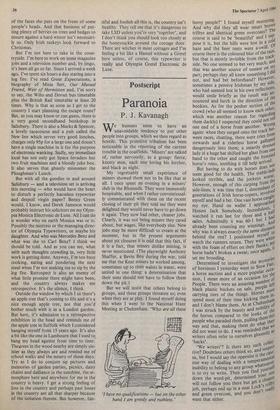Postscript
Paranoia
P. J. Kavanagh
We humans seem to have an unavoidable tendency to put other people into groups, which we then regard as hostile. This primitive tribalism has been noticeable in the reporting of the current trouble in the coalfields. 'Miners' are talked of, rather nervously, as a group: fierce, knotty men, each one loving his lurcher, and black as night.
My regrettably small experience of miners showed them not to be like that at all. I once spent an evening in a miners' club in the Rhonnda. They were immensely hospitable, and when I rather conventional- ly commiserated with them on the recent closing of their pit they told me they were delighted they would never have to go down it again. They now had other, cleaner jobs. Clearly, it was not being miners they cared about, but wages, like everybody else. New jobs may be more difficult to create at the moment, but in the present arguments about pit closures it is odd that this fact, if it is a fact, that miners dislike mining, is never mentioned. (The playwright Anthony Shaffer, a Bevin Boy during the war, told me that the Kent miners he worked among, sometimes up to their waists in water, were united in one thing: a determination that their sons should not have to follow them down the pit.)
But we will insist that others belong to groups, and these groups threaten us; even when they are at play. I found myself doing this when I went to the National Hunt Meeting at Cheltenham. 'Who are all these 'I have no qualifications — but on the other hand I am greedy and ruthless.' The Spectator 7 April 1984 horsy people?' I found myself muttering, And why did they all wear smart brown trilbys and identical green overcoats? The course is said to be 'beautiful' and I cold pose it is, but the hills were lost in a old haze and the beer tents were a-swill. Of course there is the coloured blur of the race, but that is mostly invisible from the track- side. No one seemed to bet very much, and that was another source of unease on didpart; perhaps they all knew something not, and had bet beforehand? However, sometimes a pensive Irishman by my side' who had seemed lost in his own reflections, would smile briefly as the result was an- nounced and lurch in the direction of the bookies. As for the posher section of the crowd (who all seemed to know each other, which was another reason for regarding them darkly) I suspected they could not tell one end of a horse from another. Wrong again: when they surged onto the track bet- ween races, chatting, there were cries from stewards and a riderless horse galloped dangerously into them; a smartly dressed lady in a huge hat shifted her glass from on hand to the other and caught the frenzied horse's reins, soothing it till help arrived. But having to do with horses does not seem good for the health. The stable-lads looked terrible, and the jockeys worlt However, enough of this carping from side-lines; it was time that I, descendant 0, generations of Irish horse-copers, involved myself and had a bet. One vast horse caughcit my eye. Hand on wallet I approach Jack Somebody. Incredulous, 1, watched it run last for three and a h miles. Admittedly it was 60-1 but I had already been counting my winnings. An why was it always exactly the same dislancne i behind the rest? I positioned myself r; watch the runners return. They were wht with the foam of effort on their flanks; nlYt horse hadn't broken a sweat; once again' I set me brooding. Determined to investigate the mYst,eri.ers of horsiness I yesterday went to Stow Fa ' a horse auction and a more popular oce.a,. sion, I mean more of an occasion for tric, People. There were an amazing number °it black plastic buckets on sale, people le,t carrying tiers of the things. Horses spend most of their time kicking them 11' and I don't blame them. As at Chelten. I was struck by the beauty and nobility re the horses compared to the looks ftthis people who paraded them, pulling their' ey way and that, making them do what they did not want to do. I was reminded that wr,haitcekrss,.often refer to ourselves gloomilY as one way of dealing with a tem ertshet hr any suchsant' scollectusp ,e: peramell:er
tiv
'eW? De owurbittelersss' us, but I would say the opposite is the ea'ai inability to belong to any group wbatsoe eif is to try to write. Then you find Yourscio down the word-pit, determined You! ,s et will not follow you there but get a job, perhaps end up in a neat Lock's tri al by
that either. and green overcoat, and you don't reau










































 Previous page
Previous page